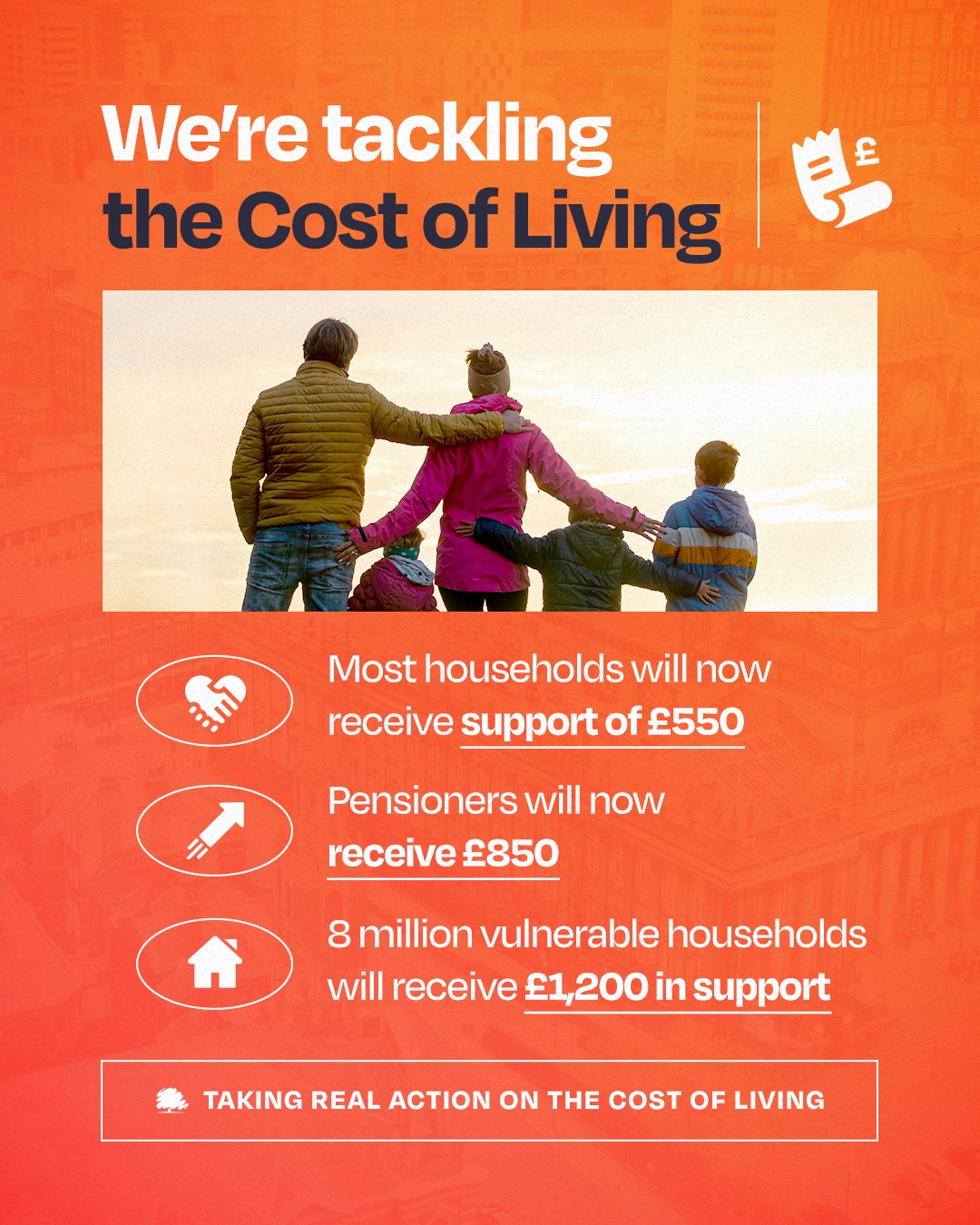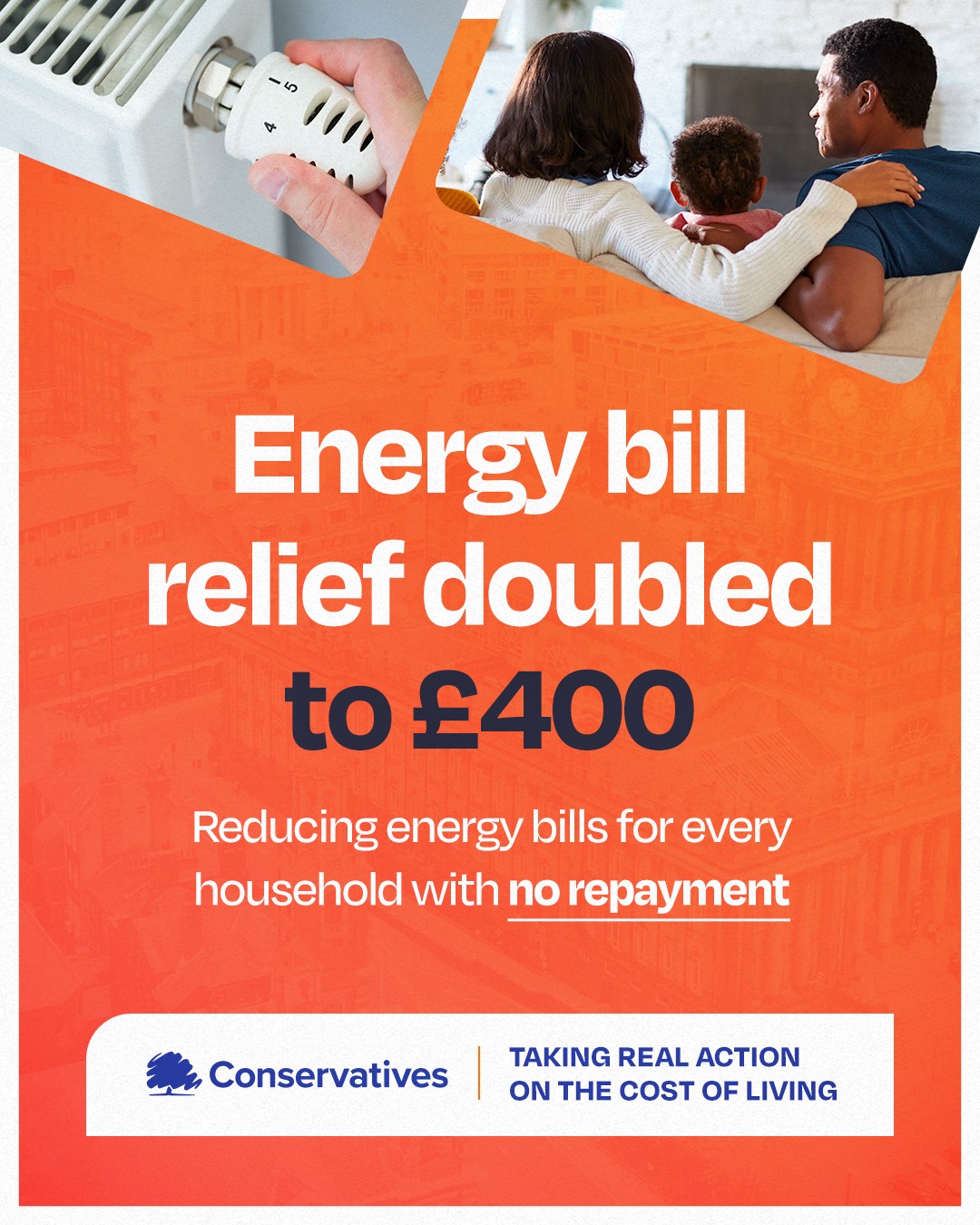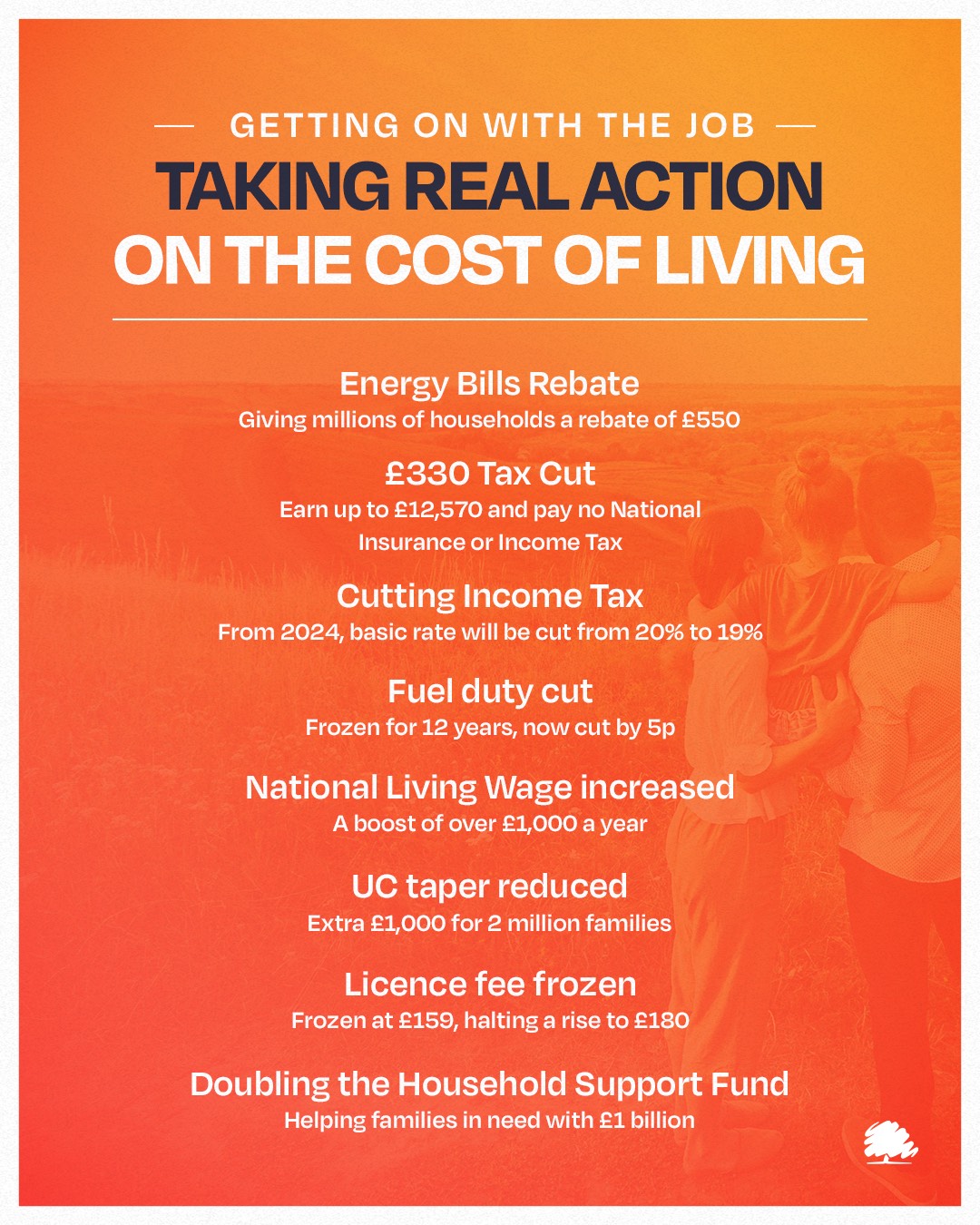We’re taking real action on the cost of living
We are now providing a total of over £37 BILLION of support to help families with the cost of living.
Due to unprecedented global problems ranging from the pandemic to war in Ukraine, the global economy is struggling. So while it is impossible for any government to solve every problem, our priority now is to help the millions of families struggling with the cost of living.

Yesterday we announced £9 billion to support the most vulnerable households, including pensioners. This is made up of:
- £650 cost of living payment for every household on means-tested benefits. This will support over 8 million of the most vulnerable households (around one third of all households in the UK) with a one-off cash payment of £650 paid out from the Department for Work and Pensions in 2 instalments (the first due in July 2022, the second in Autumn 2022). Payments for those on Tax Credits will follow one month later.
- £300 cost of living payment for every pensioner household in receipt of the Winter Fuel Payment. About 8 million pensioner households already receive Winter Fuel Payments, which we’ve increased to £300. And we will send all households in this category an additional one-off cash payment of £300 automatically in November/December 2022.
- £150 cost of living payment for those in receipt of disability benefits. There are nearly 6 million people who receive disability benefits (including Personal Independence Payments, Disability Living Allowance and Attendance Allowance), and all these people will receive an additional one-off cash payment of £150 paid out by the DWP in September 2022.
- To ensure no one slips through the net, we are putting aside £500 million to help hard cases. This will ensure that local councils can support people not covered by the payments listed above. Local councils will have discretion over how this funding is used.

Moreover, we are supporting hard-working families with £6 billion to help with energy bills:
By doubling the October £200 rebate to £400 and turning it into a cash grant. It is only fair that we should support ordinary working families as well as those on the lowest incomes. So we are doubling the £200 rebate and removing the “clawback mechanism” which will remove families’ need to repay the rebate. The rebate will continue to be delivered by energy suppliers from October, with payments spread over 6 months.
Overall, this package will benefit the lowest-income households by £1,200 – with some households receiving £1,650:
- £1,200 for those on the lowest incomes (about one third of all households), made up of:
- £650 from the one-off payment, and
- £400 from the energy bills cash grant, and
- £150 from the council tax rebate.
- Pensioners will receive £850, made up of:
- £300 from the Winter Fuel Payment, and
- £400 from the energy bills cash grant, and
- £150 from the council tax rebate.
- £550 for most hard-working families, made up of:
- £150 from the council tax rebate, and
- £400 from the energy bills cash grant.
- £1,650 for some individuals (for example a low-income household on Pension Credit who have a disability), made up of:
- £650 from the one-off payment, and
- £300 from the Winter Fuel Payment, and
- £150 from the disability payment, and
- £400 from the energy bills cash grant, and
- £150 from the council tax rebate.
Our total support to help families with the cost of living now totals over £37 billion. This amounts to 1.6% of GDP, which is either higher than or similar to the packages announced in France, Germany, Italy and Japan.
Over three-quarters of our support will go to the most vulnerable households, including pensioners.

And next year, we anticipate that benefits will be uprated by the September’s Consumer Price Index, which is likely to be significantly higher than the forecast inflation rate for next year. This comes on top of our increase to the National Living Wage, the Universal Credit taper cut and the increase in the personal income tax threshold.
Consequently, for example, people in the following categories will be thousands of pounds better off this year than last year:
- A single mother of 2 children who works full time on the National Living Wage will be £2,500 better off, made up of:
- £850 from yesterday’s announced package of measures, and
- £350 from the package of measures announced in February, and
- £1,500 from the Universal Credit taper reduction.
- A low-income household will be £3,200 better off (where there are the combined annual earnings of £26,000 from one full-time earner on £10 per hour and a part-time earner on the National Living Wage), made up of:
- £850 from the current package of support, and
- £350 from the package of measures announced in February, and
- £2,000 from the Universal Credit taper reduction.
- A low- to middle-income working family with 2 children on Universal Credit will be £4,750 better off, (where one full-time earner is on a £14.10 per hour, or ~£27,000pa, and there is a second full-time earner on the National Living Wage), made up of:
- £850 from the current package of support, and
- £350 from the package announced in February, and
- £350 from the increase in threshold of National Insurance Contributions, and
- £3,200 from the taper reduction in Universal Credit.
All throughout and after the pandemic, we have relentlessly focussed on putting money back in your pocket. Here are the 16 TAX CUTS we have introduced:
- Increasing the National Insurance personal threshold to £12,570, a £6 billion tax cut for nearly 30 million workers and worth over £330 a year, starting in July.
- Slashing fuel duty by 5p, only the second cut in twenty years and saving car drivers £100.
- Cutting business rates by 50 per cent this year for 90 per cent of retail, hospitality and leisure businesses.
- Reducing the Universal Credit taper rate to 55p, a tax cut for 2 million low-income families worth £1,000.
- Introducing a brand new Super Deduction on capital investment for companies – a £25 billion tax cut.
- Raising the employment allowance to £5,000, a new £1,000 tax cut for half a million small businesses.
- Removing VAT on energy saving materials, a £250 million tax cut for energy efficiency.
- Cutting beer duty by 5p, and freezing all alcohol duties for the third year in a row.
- Creating a new half price rate of Air Passenger Duty for domestic flights within the United Kingdom.
- Doubling creative industries tax reliefs for our world-leading theatres, orchestras, museums and galleries.
- Creating new business rates reliefs to incentivise improvements and green investment.
- Extending the £1 million Annual Investment Allowance for a further 15 months during the pandemic.
- Reducing VAT to a temporary 5 per cent rate for retail, hospitality and leisure during the pandemic.
- Cutting stamp duty for house sales under £500,000 for a total of fifteen months during the pandemic.
- Removing VAT from e-books and e-publications.
- We will cut income tax by 1p in 2024, the first cut for 16 years, worth £5 billion for over 30 million workers, savers and pensioners.